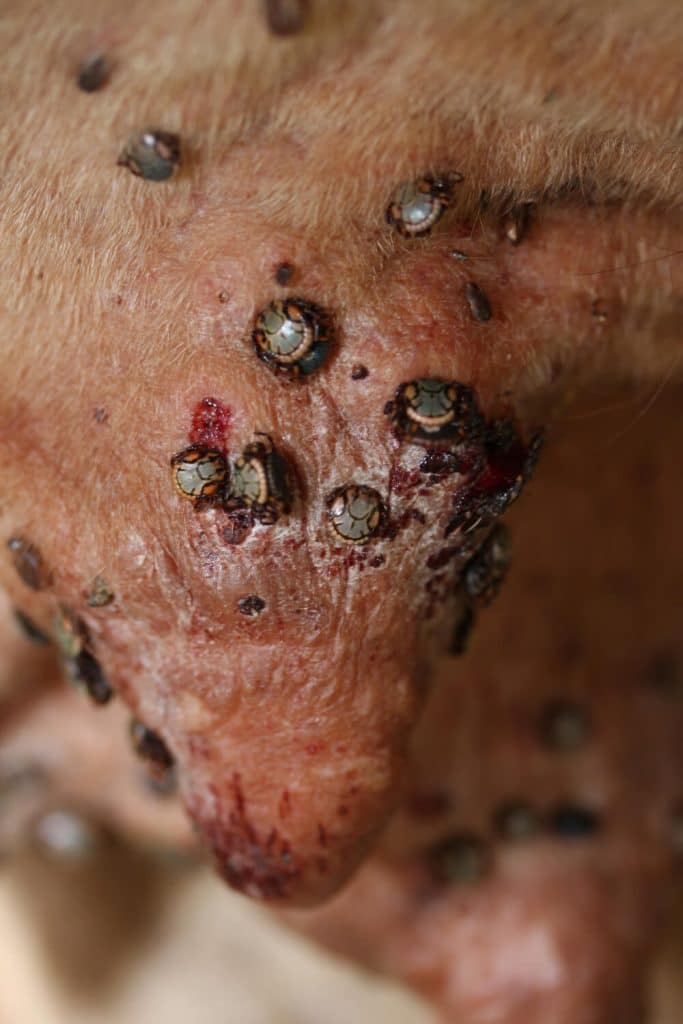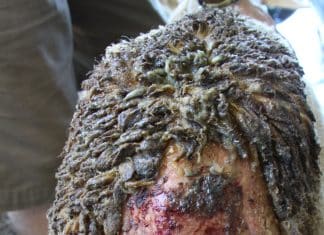The prevention and treatment of heartwater cost the livestock industry millions every year. Animals die acutely from the disease, and its incidence is preventing non-resistant animals from utilising the grazing in certain areas. It presents a great challenge when animals are moved from an area without heartwater to another where the disease does occur.
The disease is caused by an organism called Ehrlichia (Cowdria) ruminantium. It is a very small organism of approximately 2μm (two thousandths of a millimetre), and it is transmitted to susceptible animals by the bont tick (Amblyomma hebraeum). Heartwater only occurs where the bont tick is found and therefore it is limited to the hot and humid Lowveld or Bushveld areas. The disease is mostly found in the eastern parts of South Africa, from the Limpopo province to as far south as Mossel Bay in the Western Cape.
Symptoms of the disease
Animals are infected when they are bitten by an infected tick. The organisms grow
in the lymph nodes of ruminants over the next 28 days and then spread to the cells
lining the blood vessels. During this short period and shortly thereafter, the animals develop a high fever and several nervous system related symptoms can be observed.

The main organs affected are the brain and lungs. Excessive fluid starts to leak from the damaged blood vessels causing pressure on the brain and leading to severe nervous twitching and death. Infected animals react excessively to external stimuli and various clinical signs can be observed. Animals start trembling, rapidly blink their eyes, especially if the head is handled, and the forelegs tread high, as if the animal is intoxicated. Some
animals continue chewing without food in the mouth, and in advanced stages animals lie on their side, making running movements with their legs, with the head and neck pulled backwards.
As fluid collects in the lungs, the animals breathe more rapidly and in severe cases can ‘drown’ due to the excessive fluid. This fluid often runs from the nose in the form of white froth after the animal has died. During a post-mortem it can often be observed that the lungs are ‘heavy’ with a clear fluid that runs from the lungs when an incision is made, with notable white froth in the trachea. A clear fluid can also be found in the pericardium, thoracic cavity and occasionally in the abdomen. A definite diagnosis is made by examining a brain smear under a microscope, where the parasites become visible in the blood vessel cells.
Appropriate treatment
Oxytetracycline antibiotics are used to treat heartwater. The medication should be administered in time and at the right dosage. In severe cases it should be administered
slowly intravenously. It is always advisable to administer a dose of cortisone as well. The cortisone helps to stabilise the blood vessels and cell walls resulting in less fluid leak, and it helps to relieve pressure on the brain.
Infected animals should not be kept alone in a camp. Ruminants are herd animals who prefer not to be alone. Place one or more healthy animals in the camp with a sick one to limit stress and to fasttrack the healing process. Provide soft feed and water as well as sufficient shade. Ensure that animals that are lying down, are kept in an upright position to prevent bloating, and turn them on the other side four or five times a day to promote blood
flow to the muscles.
It is advisable to administer a vitamin B complex to promote recovery of the nervous system and to stimulate the appetite. Animals that exhibit signs of infection for a few days, should be given brown sugar, vinegar or brewer’s yeast to stimulate the rumen.
Vaccine against heartwater
Heartwater blood vaccine is the appropriate method of protecting animals against the disease. Animals should be dipped regularly to control the tick population. The heartwater vaccine is administered intravenously, but the instructions have to be followed closely. Pregnant animals must not receive blood, as the fever reaction can lead to abortions. Animals under the age of three weeks should not become sick if they were immunised, but those older than three weeks should be monitored closely as they can develop a severe reaction to the vaccine.
It is advisable to measure the animal’s temperature for a period of five days following administration of the vaccine, preferably twice daily. As soon as it becomes feverish, the animal can be treated with oxytetracycline. Animals that are immune should, in fact, often be bitten by infected ticks to maintain their immunity, else they can lose immunity after approximately nine months. –By Dr Johan van Rensburg, Afrivet
For more information, phone Dr Johan van Rensburg on 082 336 5498.







